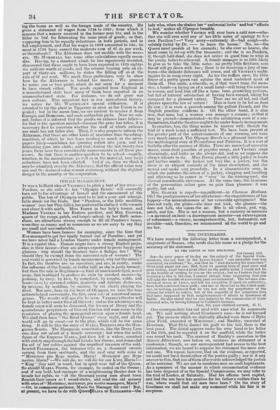THE INCENDIARIES.
WE have received the following letter from a correspondent, a magistrate of Sussex; who sends also his name as a pledge for the accuracy of his statement.
TO THE EDITOR OP THE SPECTATOR.
2nd January 1831.
SIR—In your paper of to-day on the subject of the Special Commissions, you say that at the Lewes Assizes "one miserable man was convicted, on evidence," &c., and that he "died declaring his innocence."'
Were your paper not one, that, from its general tone of good sense and good feeling, must have a great effect on the public mind, I would not be at the trouble of writing to you on the subject ; but as 1 believe that the contrary to this is the case, I cannot refrain from requesting that you will take the trouble of correcting your misstatement, The.two men convicted of arson at Lewes, and left for execution (I speak on authority), have both confessed their guilt ; and one of them has in the fullest manner, in writing, professed that he was not only the perpetrator of the offence for which he suffers, but of the majority of the numerous fires that have happened in that neighbourhood—I allude to Goodman of Battle. He also stated that he was induced to the commission of these criminal acts, by having listened to Cobbett's lectures.
I am, Sir, your obedient servant, G. U. Our correspondent has not read with care what he comments
on. We said nothing about Goodman's case—he is not hanged yet. The cases to which we distinctly alluded were those of Dyke alias Field, executed at Warclstone ; and Bushby, executed at Horsham. That Dyke denied his guilt to the last, there is the best proof. The denial appears under his own hand in his letter of the 18th, and he repeated it on the scaffold, while the halter was round his neck. The account of Bushby's execution in the Sussex Advertiser, now before us, contains no statement of a confession ; though, as our correspondent had access to the best information, we are bound to suppose his statement the more correct one. We repeat, however, that on the evidence, as reported, we could not have found either of the parties guilty ; nor is it any answer to this, that one of them afterwards acknowledged the justice of his sentence. We are not to condemn men on such haphazards. As a specimen of the manner in which circumstantial evidence has been disposed of in the Special Commissions, we may refer to the trial of Looker, at Salisbury. Had his offence been capital, and had the son been less anxious for his father's welfare than he was, where would that old man have been ? On the story of Goodman we shall not make any comment while his fate is in suspense.


























 Previous page
Previous page